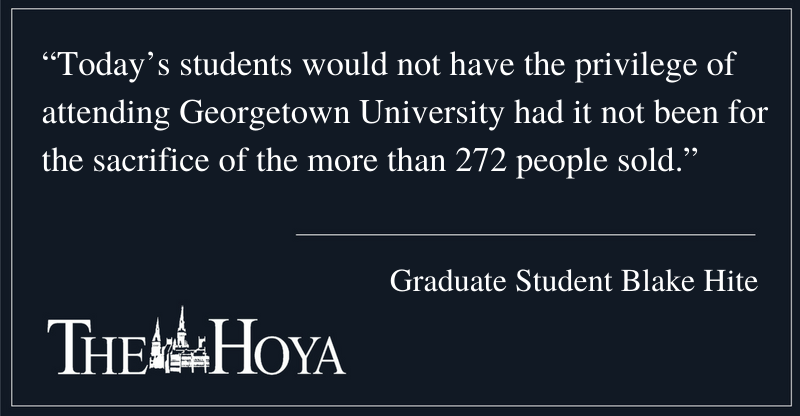With the words of Martin Luther King Jr. before me, I am reminded that evil often succeeds when “moderates” do nothing. Indeed, the graduate student body has been content with a moderate role, one where we wait to be asked our opinion instead of advocating for reform.
My growing frustration since accepting admission to Georgetown University is tied to the legacy of racism and slavery that we — the students, administrators and staff of Georgetown — are finally confronting. Unfortunately, the university has chosen a moderate approach that has included renaming a few buildings, apologizing, and continuing important outreach to descendant families. Real justice for the GU272, however, would include reparations paid to descendants of the 272 enslaved people sold by the Maryland Province of the Society of Jesus in 1838 to financially sustain the university.
These crimes remain acknowledged by Georgetown in word, but not in deed. When the undergraduate student body overwhelmingly approved a reparations fee of $27.20 to be added to their tuition each semester, the administration cloistered itself and waited to approach the Graduate Government — and every one of the thousands of stakeholders we represent — until a solution had already been identified. When GradGov was briefed during the November senate meeting late last year, the university had already decided how to address the issue: a yearly fundraising goal of $400,000.
The administration has said that fundraising is ideal because it could result in more funds than the fee would have raised, which is true. Yet I have never heard of a court ordering someone to fundraise to repay victims. Justice demands that the university not host a voluntary fundraiser, but rather institute a mandatory fee for all students. The fee not only holds value because it recognizes and intervenes on a problem needing help, but also because it is an unavoidable symbol of past guilt. It is the admission of guilt, coupled with mandatory restitution, that enables injustices to be righted.
I have heard some graduate students worry that the Jesuit institution itself should pay the reparations. I assent in part. While the Jesuits are morally obligated to pay some reparations, the university — through a fee paid by students — has an obligation as well. Georgetown was in financial crisis when the decision was made to sell enslaved people, according to a publication from the university’s Working Group on Slavery, Memory, and Reconciliation. The university owes its continued existence to this sale. Today’s students would not have the privilege of attending Georgetown had it not been for the sacrifice of the more than 272 people sold. Since students benefit from Georgetown’s prestige the moment they step on campus, they are continuing to benefit from the crimes of 1838. Reconciliation, therefore, is undeniably part of our responsibility as students.
Students have also expressed concern that reparations may be ineffectual or too difficult to properly allocate. The front page of Georgetown’s website boasts that the university educates our minds and hearts with intellectual rigor on topics including social justice. If this is true, then I am confident that with a diverse group of students, faculty and administrators, we can find an effective way to use these funds to correct current social justice issues in our community or elsewhere. Even while determining how to specifically allocate the funds, however, we should be able to definitively commit to the collection of this fee.
Paying into the fund should not be optional. While other academic institutions like Princeton University have created similar reconciliation funds for similar reasons, Georgetown should be the first to issue a mandatory reparation fee. That 66.1% of Georgetown’s undergraduate student body want such a fee underscores the salience of this moment in history. Our institution has a responsibility to finally take this first step toward addressing the racial injustices it continues to benefit from. Georgetown has an opportunity to act on the referendum and work toward real justice for some of its crimes —the administration should make it count.
Blake Hite is a graduate student in the health and the public interest program. He currently serves in the Graduate Government as the chief of staff.















Evan • Nov 6, 2020 at 10:17 pm
I’ve never heard of a court ordering people who were not even born when a crime occurred to pay the crime’s great-great-great grand children 200 years after the crime occurred.
d wallace • Feb 22, 2021 at 10:54 pm
You heard of it Evan. They were beast anyways? Who cares right? If you attend GU you would not had it not been for them. I always hear my fore fathers died for this country. Is it all fore fathers? Is it all? Japan, Germany, and Phillipines to name a few get reparations. I am a descendent. I dont need no ones money. However, my son should be able to got to GU free of charge as long as he is academically eligible. Free of charge like an athlete. How about that? Georgetown Prep for my son how about that? I have my dna results? Put the icing on the cake both of my children are in the Archdioceses schools.
Jim • Feb 10, 2020 at 1:04 am
lol wait a minute, we’re letting GradGov think for itself now? Actually, let me take a step back. GradGov is a thing?
Adam K Myers, Professor • Feb 9, 2020 at 12:46 pm
As a faculty member of Georgetown University, I concur with Mr. Hite’s viewpoint. The students, through their referendum, have sent a powerful and unselfish message and their wish to contribute to reparations should not be denied. The University would be a better place if faculty and staff were to follow the students’ lead and participate in making reparations to the descendants and the University, on its part, would not stand in the way of such initiatives.